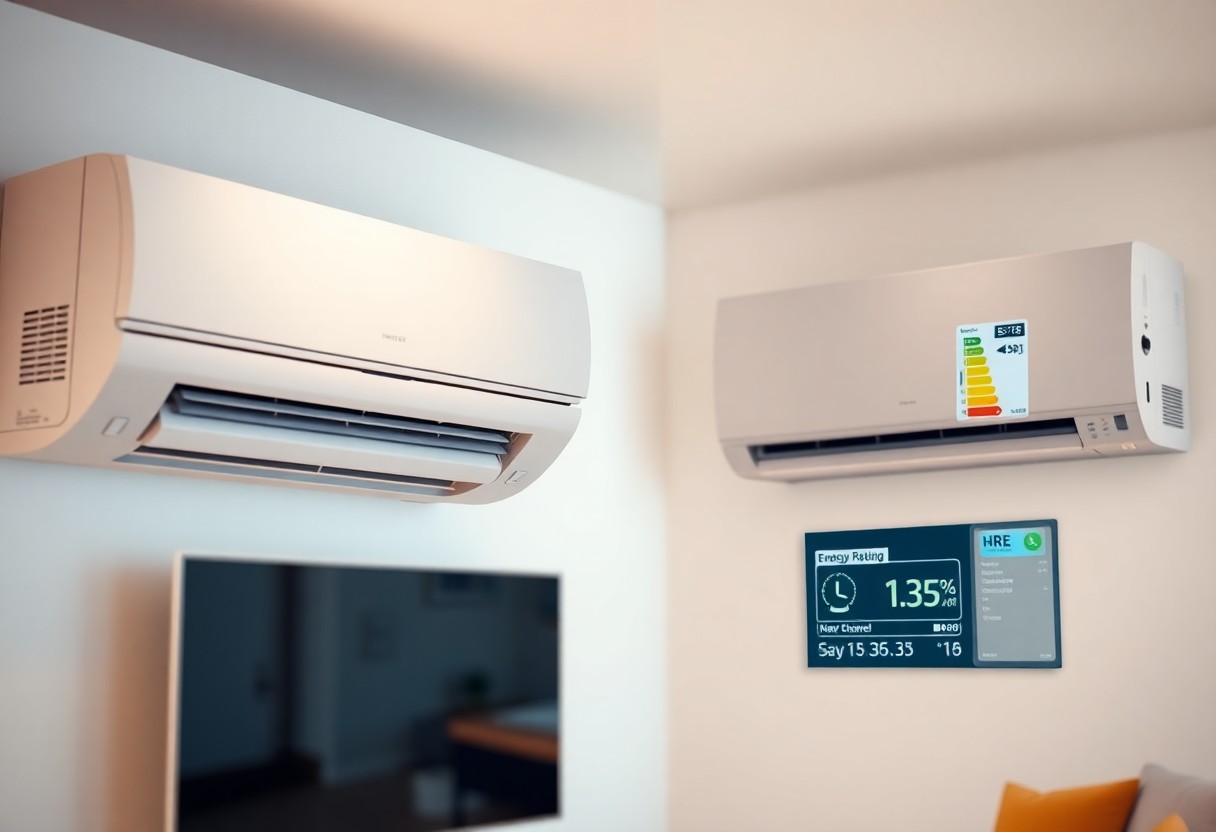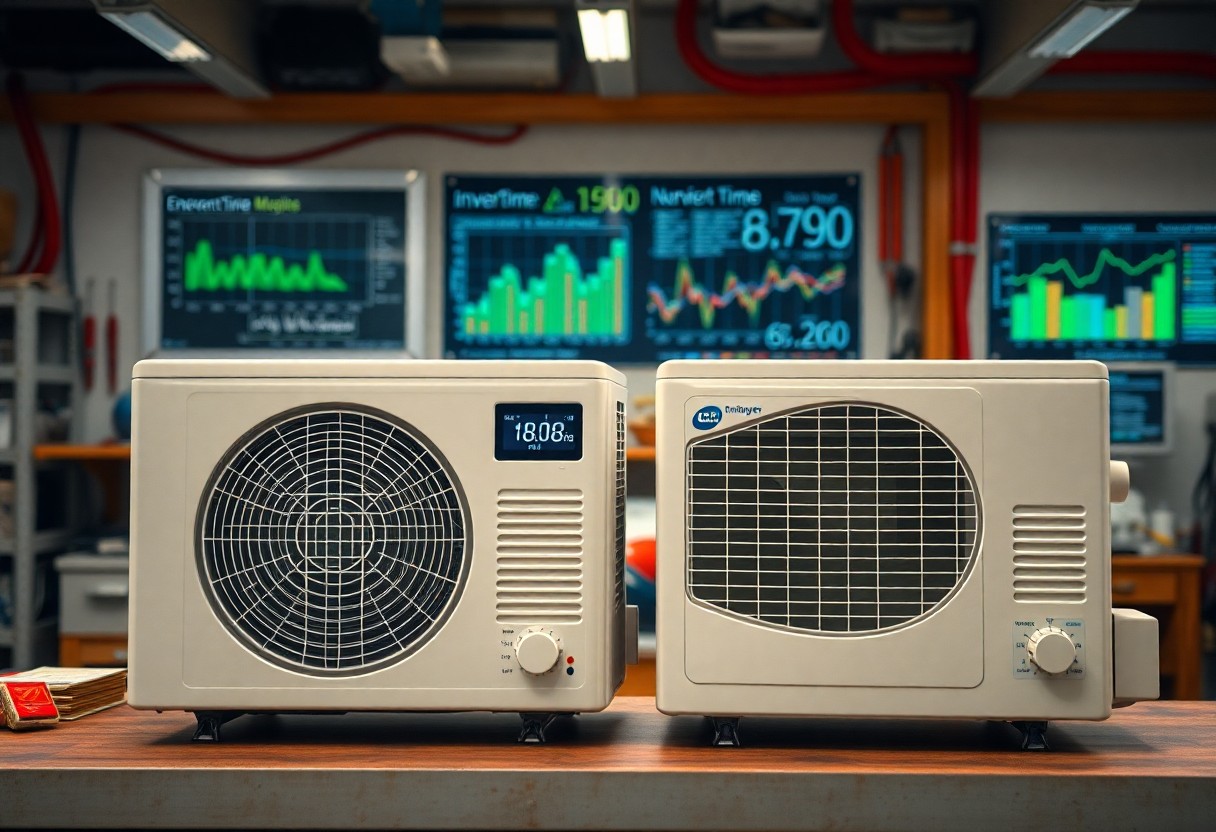There's a significant difference in energy efficiency between inverter and non-inverter air conditioners that directly impacts your savings on utility bills. Understanding how these systems operate can help you make a more informed decision when selecting an air conditioning unit for your home. This post will break down the key features of both types, allowing you to see how their efficiency levels affect your overall energy consumption and costs.
Key Takeaways:
- Inverter air conditioners adjust their compressor speed based on the cooling demand, leading to lower energy consumption compared to non-inverter models.
- Non-inverter air conditioners operate at fixed speeds, causing frequent on-off cycles that can increase energy costs.
- Inverter models typically provide more consistent temperature control and comfort while using less power over time.
- The initial cost of inverter air conditioners can be higher, but they often result in long-term savings on electricity bills.
- Overall energy efficiency ratings for inverter units tend to be superior, making them a better choice for environmentally-conscious consumers.

The Technology Divide: Inverter vs Non-Inverter Mechanics
Understanding the mechanics behind inverter and non-inverter air conditioners clarifies their energy efficiency differences. Inverter air conditioners utilize variable speed compressors that adapt to the cooling demands of your space. This technology allows for continuous operation, maintaining a consistent temperature while using less energy. Conversely, non-inverter air conditioners operate on a fixed speed principle, turning on and off to reach the desired temperature, which can lead to energy wastage and increased consumption.
How Inverter Technology Alters Energy Consumption
Inverter technology significantly reduces energy consumption by adjusting compressor speed according to real-time cooling needs. Instead of running at full capacity constantly, it modulates power output, resulting in up to 30-50% less energy use compared to traditional systems. This not only lowers your utility bills but also lessens wear and tear on the unit, promoting a longer lifespan.
Non-Inverter Systems: The Traditional Approach to Air Conditioning
Non-inverter systems operate using a straightforward on/off mechanism. When the desired temperature is achieved, the compressor shuts off, and when the temperature rises, it starts again at full power. This cycling leads to higher energy use and creates temperature fluctuations that can be uncomfortable. You may notice spikes in your energy costs during peak usage times due to this inefficient operation.
The traditional non-inverter system typically costs less upfront than inverter models, making it appealing for budget-conscious consumers. However, this initial savings often translates into higher long-term energy costs, with outdated technology that consumes significantly more energy. A standard non-inverter air conditioner may operate at a steady 1.5 kW, continuously switching on and off, which can lead to an annual increase in electricity bills by hundreds of dollars. Over time, the inefficiency of these systems makes them less economical, especially in regions with high cooling demands.

Evaluating Energy Savings: A Quantitative Comparison
| Type | Energy Consumption (kWh/month) |
|---|---|
| Inverter AC | 150 |
| Non-Inverter AC | 250 |
Real-World Consumption Data: Inverter Units
Inverter air conditioners typically exhibit lower energy consumption in real-world settings, averaging around 150 kWh per month compared to 250 kWh for non-inverter units. This efficiency comes from their ability to modulate compressor speed, thus optimizing energy use without sacrificing cooling power. Users have reported energy bills decreasing by up to 30% when switching to inverter technology.
The Cost of Cooling: Long-term vs Short-term Savings
Initial investment in inverter ACs is higher, but their energy savings manifest significantly over time. You may see payback periods ranging from 2 to 5 years, depending on usage. In contrast, non-inverter units may offer lower upfront costs but lead to higher operational expenses, making inverter systems more cost-effective in the long run.
Over a typical lifespan of 10 to 15 years, the difference in electricity costs can equate to thousands of dollars. For example, if your non-inverter unit consumes 100 kWh more per month, you could face an extra $300 in bills annually. While the upfront cost for an inverter is about 20% higher, the savings on energy could outweigh these expenses within a few years, aligning with financial sensibilities and sustainability goals.
The Environmental Impact: Making Sustainable Choices
Choosing between inverter and non-inverter air conditioners significantly influences your environmental footprint. Inverter models adapt their speed based on cooling requirements, leading to reduced energy consumption and fewer greenhouse gas emissions. Non-inverter units, while often less expensive upfront, tend to operate at full capacity continuously, resulting in higher energy use and environmental impact over time. By opting for an inverter system, you not only save on energy bills but contribute to a sustainable future.
Carbon Footprint Analysis: Inverter vs Non-Inverter
Inverter air conditioners typically release less carbon dioxide during operation compared to non-inverter models. The efficiency of inverter systems allows them to consume up to 30-50% less energy, translating to a noticeable reduction in carbon emissions. Non-inverter units, operating at constant speeds, can significantly increase your carbon footprint, especially in larger spaces. Thus, selecting an inverter unit can be a pivotal choice for those aiming to minimize their environmental impact.
Regulatory Trends and Energy Efficiency Standards
Regulations worldwide increasingly favor high-efficiency air conditioning systems, emphasizing the significance of energy-saving technologies. Many governments have set stringent standards, such as SEER (Seasonal Energy Efficiency Ratio) ratings, that favor inverter systems for their superior performance. Compliance with these standards not only impacts your choice of an air conditioner but also influences the availability of models in the market.
Current regulatory trends aim to phase out less efficient non-inverter units, pushing manufacturers to innovate in energy-saving technologies. For instance, the U.S. Department of Energy has proposed updated efficiency standards, intending to raise the minimum SEER rating for air conditioners significantly. Adhering to these evolving regulations not only aligns with environmental goals but can also lead to incentives and rebates for homeowners investing in energy-efficient systems. As standards become stricter, choosing an inverter air conditioner not only makes financial sense but also positions you as a responsible consumer in the fight against climate change.
Overcoming Common Misconceptions: Busting Myths in Air Conditioning
Myths surrounding air conditioning units often mislead buyers. One prevalent misconception is that inverter units are only efficient in warmer climates, while non-inverter units are universally effective. In reality, inverter air conditioners modulate their cooling output based on current conditions, making them energy-efficient in any environment, regardless of external temperatures. Discerning fact from fiction is key for optimized purchases.
Inverter Air Conditioners: Not Just for Warm Climates
Inverter air conditioners excel in both hot and cool climates. By adjusting compressor speeds to maintain consistent temperatures, they provide efficient heating and cooling year-round. This versatility means you can enjoy substantial energy savings without worrying about seasonal efficiency drops, making inverter models a wise choice regardless of your local climate.
Cost vs Value: Are Non-Inverter Units Really Cheaper?
Initial costs of non-inverter units might appear lower, but the long-term implications of energy consumption tell a different story. Over several years, the higher operational costs can overshadow the savings from the purchase price. Choosing an inverter model can result in significant energy savings that accumulate over its lifespan, ultimately reflecting its true value.
Analyzing the cost versus value in air conditioning units reveals that non-inverter units may seem less expensive upfront, often priced between $300 to $600. However, their energy consumption can lead to monthly electricity bills that are significantly higher, especially in peak usage periods. In contrast, inverter units might cost more initially, typically ranging from $800 to $1,200, but their efficiency can lower energy bills by up to 30%, offering a break-even point in roughly three to five years. Considering maintenance, performance longevity, and energy costs makes inverter units a better investment for most homeowners.
Making an Informed Decision: Choosing the Right System for Your Needs
Understanding your specific requirements allows you to select the ideal air conditioning system. Factors such as room size, frequency of use, and budget will significantly influence your choice. Whether you prioritize energy savings or upfront costs, recognizing how each type aligns with your lifestyle ensures maximum comfort and efficiency.
Key Factors to Consider Before Purchase
Evaluate these critical factors to make an informed choice:
- Room size and layout
- Installation costs
- Energy consumption and efficiency ratings
- Climate and environmental factors
- Your budget and long-term savings goals
Recognizing which factors impact your decision aids in selecting the most suitable system for your needs.
Expert Recommendations: When to Opt for Inverter Technology
Inverter technology is advisable if your air conditioning usage is high, leading to frequent cycle adjustments. This tech excels in energy conservation, offering savings of up to 30% compared to non-inverter models. When you prioritize consistent comfort and lower operational costs, especially in extreme climates, opting for an inverter system becomes beneficial.
Experts generally suggest selecting inverter technology in settings where temperature control is imperative, such as homes in warmer regions or environments where air conditioning is used extensively. Inverter units work by adjusting compressor speed, providing more precise cooling and heating, which translates to energy savings over time. If you anticipate using your air conditioning for more than a few hours daily, investing in an inverter system can lead to significant reductions in energy bills, making it a wise long-term choice. The lower noise levels and better air quality further enhance the living experience.
Summing up
On the whole, when considering energy efficiency savings between inverter and non-inverter air conditioners, you will find that inverter models typically offer superior performance. By adjusting their compressor speed, these units consume less electricity during operation, leading to significant long-term savings on your energy bills. Non-inverter units, while often less expensive upfront, generally operate at fixed speeds and can lead to higher energy consumption over time. Therefore, investing in an inverter air conditioner can result in noticeable savings and increased comfort for your home.
FAQ
Q: What is the main difference between inverter and non-inverter air conditioners?
A: Inverter air conditioners adjust the compressor speed to maintain the desired temperature, while non-inverter air conditioners operate at a fixed speed, turning on and off to regulate temperature.
Q: How do inverter air conditioners contribute to energy savings?
A: Inverter air conditioners use variable speed compressors that run continuously at different speeds, which reduces energy consumption by avoiding the high startup power draw associated with non-inverter models.
Q: Are inverter air conditioners more expensive to purchase than non-inverter models?
A: Yes, inverter air conditioners generally have a higher upfront cost; however, they offer potential savings on electricity bills over time, which can offset the initial investment.
Q: How much energy can I expect to save by using an inverter air conditioner?
A: Energy savings can vary, but inverter air conditioners can be up to 30% to 50% more energy-efficient than non-inverter units, depending on usage and environmental conditions.
Q: Is maintenance different for inverter and non-inverter air conditioners?
A: Maintenance requirements are similar; however, inverter units may require more specialized service due to their advanced technology and components, ensuring optimal performance and efficiency.







